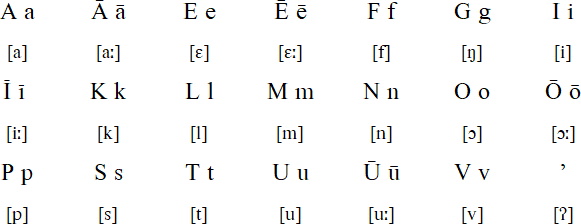Futunan is a Polynesian language with about 3,000 speakers in the kingdoms of Sigave and Alo on the islands of Futuna and Alofi, which are part of the French Overseas Territory of the Wallis and Futuna Islands in the South-West Pacific Ocean. There are also many Futunan migrants in New Caledonia and elsewhere in the Francophone Pacific.
The language is often called East Futunan in order to distinguish it from the related West Futunan, spoken on the Polynesian outlier of Futuna in Vanuatu. It is also known as Futunian, and Futunan speakers call it Fakafutuna. Futunan is also related to but not mutually intelligible with the East Uvean language in the kingdom of Uvea on Wallis Island, the indigenous name of which is Uvea as well. In addition, there is also a related West Uvean language, spoken on the Polynesian outlier of Uvea in the Loyalty Islands, New Caledonia.
The linguistic lineage for Futunan is: Polynesian, Nuclear Polynesian, Samoic-Outlier, Futunic. However, its exact place within Nuclear Polynesian remains unclear.
The vowel inventory of Futunan consists of five segments as listed below and is similar to most other Polynesian languages in that respect. These vowels have approximately Spanish values and also occur geminated (i.e. as sequences of two identical vowels).
The consonant inventory consists of eleven segments as listed below and is one of the larger ones in Polynesia. By comparison, Hawaiian features eight consonants, Tongan twelve.
The Futunan syllable structure may be summarised as follows: (C)V(V), i.e.: (an optional consonant, followed by an) obligatory vowel (or geminated vowel).
Full and partial reduplication, as well as prefixes and suffixes, are used extensively for word formation and the expression of various grammatical and semantic categories. The causative prefix is faka-.

Information provide by Emanuel Fuchs, a linguist from Vienna, Austria.
Source: https://www.bible.com/bible/2719/LUK.11.FB2000
Source: https://www.bible.com/bible/1/LUK.11.KJV
Information about Futunan | Numbers | Tower of Babel
Information about the Futunan language
http://en.wikipedia.org/wiki/Futunan_language
https://www.ethnologue.com/language/fud
https://lepetitprince.eu/world/asia-pacific/fakafutuna/
https://dominicweb.eu/en/dictionaries/futunan/
Languages written with the Latin alphabet
Page last modified: 02.05.24
[top]
You can support this site by Buying Me A Coffee, and if you like what you see on this page, you can use the buttons below to share it with people you know.

If you like this site and find it useful, you can support it by making a donation via PayPal or Patreon, or by contributing in other ways. Omniglot is how I make my living.
Note: all links on this site to Amazon.com, Amazon.co.uk
and Amazon.fr
are affiliate links. This means I earn a commission if you click on any of them and buy something. So by clicking on these links you can help to support this site.
[top]